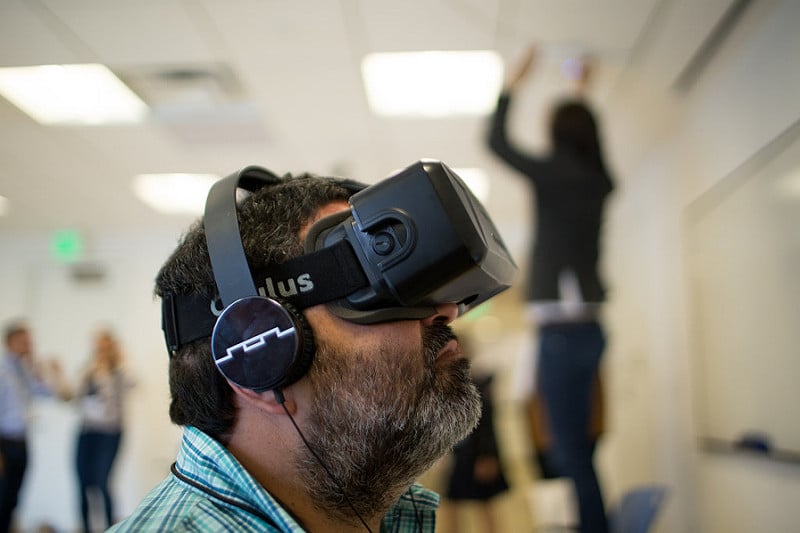
Photo: UTKnightCenter on Visualhunt.com / CC BY
Arts Council to launch new £1m digital skills network
The DCMS has published an ‘action plan’ to help cultural organisations make the best use of new technology.
A £1.1m Digital Culture Network will be set up to increase digital skills and capability in England’s arts sector, as part of a raft of plans announced by the DCMS.
A new Government report also commits the National Gallery and the Royal Opera House to creating new tools to support audience development and creative experimentation in the sector.
“Our cultural output has always been our unique calling card to the rest of the world and when combined with the latest digital developments there is no limit to our creativity,” said Culture Secretary Matt Hancock at the launch of the DCMS’s Culture is Digital report this week.
“We want the UK to be the best place in the world to trial pioneering technology, while also maintaining our world leading status as a centre of artistic and cultural excellence.”
Action plan
Unveiled at the National Gallery, the report intends to highlight “innovative projects in the creative sector” and collaborations between “cultural and digital pioneers”. It also makes a series of policy commitments designed to be an ‘action plan’ for cultural and tech organisations.
It was informed by a series of online conversations, which revealed arts organisations are being held back from using digital technology by poor infrastructure, a lack of skills and resources, and the pace of change in the tech industry.
The policy commitments are focused on three themes: using digital technology to engage audiences; building the skills and the digital capacity of cultural organisations; and unleashing the ‘creative potential’ of technology through a new Future Strategy.
Digital Culture Network
Chief among the commitments is a new £1.1m Digital Culture Network, to be set up by Arts Council England (ACE). It will work to increase the ‘digital maturity’ of ACE-funded organisations, to embed digital skills, facilitate partnerships and collaborative working, and provide guidance to senior leaders.
The network will have similar responsibilities to The Space digital agency, which ACE just confirmed a three-year funding package for. The £3m grant – almost 50% less than The Space received in 2014-18 – will support a “programme of digital skills development” for arts and culture organisations.
When asked about the potential overlap, an ACE spokesperson said the two pieces of work were separate. “The Space are going to be supporting arts and culture organisations to extend the digital reach of arts content and experiences,” they told AP.
“The work they’re doing is very much about creative and digital content, whereas the Digital Culture Network will focus on increasing the sectors’ technical skills and capabilities across the entirety of the business model of arts organisations, museums and libraries, and supporting the development of a data culture in the sector.”
The report includes specific guidance for The Space, including an instruction to work with the sector and partners including The Audience Agency and the BBC to develop a ‘metrics framework’ and best practice guidance for arts and cultural organisations to use when planning and assessing audience engagement across digital platforms.
The Space will also work with cultural organisations and the Intellectual Property Office to develop a Cultural Digital Rights Code of Practice, building on its past advocacy work.
Funding for the new network will be drawn from Development Funds, and ACE expects to finalise its design by this summer.
Benchmarking and guidelines
The report also directs ACE to pilot a ‘Digital Maturity Index’, which will allow organisations to benchmark and improve their digital capabilities, and to work with the Heritage Lottery Fund to form a ‘Digital Culture Code’.
The code will set out guidelines and principles for cultural organisations, such as a commitment to data sharing, which will help organisations “understand what is being asked of them” by government and funders.
ACE will also collaborate with Google on a new project which will explore ways to help organisations “improve their online presence, reach new audiences and create exciting digital experiences”.
Innovation and audience labs
The DCMS report includes specific commitments for the National Gallery and Royal Opera House aimed at creating “new opportunities for the culture sector to experiment with new technology and cultural content”.
The National Gallery will create an ‘Innovation Lab’, working with partners such as Nesta, to explore how museums and cultural organisations can use new technology, including virtual and augmented reality, to enhance visitor experiences.
Meanwhile, the Royal Opera House will create an Audience Lab, which will help organisations create content using emerging technologies and support cross-sector collaborations.
Dr Gabriele Finaldi, Director of the National Gallery, said: “The National Gallery is committed to an ambitious five-year programme of digital change. This goes from evolving our approach to ticketing through the use of big data, to launching new mobile services, to embedding innovation in immersive media in the Gallery through our forthcoming Lab.”
Join the Discussion
You must be logged in to post a comment.